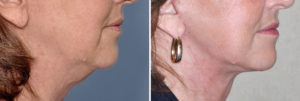
Moreover from a patients perspective, they are completely unaware of these types of non-skin efforts and, while they are very interested in getting a good long-term result, there are certains aspects of a facelift from which they have more important concerns.
First and foremost, patients certainly do not want to sustain any complications from surgery particularly om their face. The most dreaded complication of a facelift would be an injury to the facial nerve. While such a rare injury, if it occurs may only be temporary, but any form of transient facial nerve paralysis is unsavory. Deeper plane facelifts definitely have a greater risk of this problem. The balance of its benefits vs its risks must be thoroughly discussed with your plastic surgeon during your consult.
Secondly, patient do not want to have any telltale signs of having had a facelift. This would be the result of poor scar placement around the ears or an altered temporal hairline that is moved up too high. In my opinion, proper incision placement is more important than whether one does a deep plane technique or not. Also, patients definitely do not want an unnatural look from being pulled ‘too tight’. I have yet to see a patient who has asked that their face be pulled as tight as possible. What patients have to realize is that their cheek-lip grooves (nasolabial folds) or the down turning of the corners of the mouth will not be improved no matter how tight a facelift is pulled. They require other simultaneously done procedures at the time of the facelift to get improvement in those aged areas.
Lastly, most patients really don’t want a long social recovery after a facelift, meaning that they look ‘bad’ for two or three weeks due to swelling and bruising. No matter how good the long-term result will be, they will never forget that type of recovery. Patients want a good result, but they also want a recover that is not unduly prolonged.
Facelifting surgery is a balance of how aggressive to be with the lifting and tightening process at the risk of a longer recovery and an increased rate of complications. A good thorough consult before your facelift with your plastic surgeon should cover these issues in detail so you can make an informed decision.
Dr. Barry Eppley
Indianapolis, Indiana


